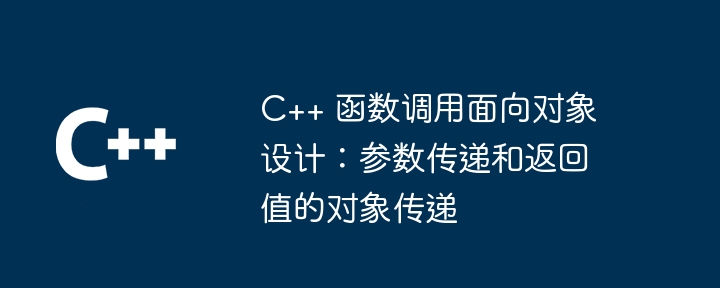
In a C function call, parameters can be passed by value (receiving a copy of the parameter) or by reference (receiving a reference to the actual object). Return values can also be passed by value or by reference. Passing by value copies the object, while passing by reference passes a reference to the object, thus affecting the actual object.

C Object-oriented design of function calls: parameter passing and object passing of return values
Introduction
In object-oriented programming, the function calling mechanism plays a crucial role. When calling a class method or function, parameters and return values can be passed by value or by reference. This article will deeply explore the object passing mechanism of parameter passing and return value in C, and demonstrate it through practical cases.
Parameter passing
In C, parameters can be passed to functions by value or by reference. Passing by value means that the function receives a copy of the argument, while passing by reference means that the function receives a reference to the actual object.
Value transfer:
void swap(int a, int b) {
int temp = a;
a = b;
b = temp;
}The above swap() function pairs two integers An exchange was made. Since a and b are passed by value, modifications to them inside the function will not affect the actual variables outside the function.
Pass by reference:
void swap(int& a, int& b) {
int temp = a;
a = b;
b = temp;
}The modified swap() function uses pass by reference , which means that modifications to a and b inside the function will be propagated back to the outside of the function.
Object passing of return value
Function can not only receive objects through parameters, but also return objects through return values. Likewise, objects can be returned by value or by reference.
Value passing:
Point getPoint() {
return Point(x, y); // 复制构造函数被调用
}##getPoint() The function returns a Point Object. Since function return values are passed by value, objects constructed inside the function will be copied outside the function.
Pass by reference:
Point& getPoint() {
return Point(x, y); // 返回对临时变量的引用
}getPoint() function returns by References to temporary variables implement pass-by-reference. Therefore, a reference to the actual object can be obtained outside the function. However, it should be noted that if the function returns a reference to a local variable, the local variable will be destroyed when the function returns, and the reference will become invalid.
Practical case
Consider the following code:class MyClass {
public:
MyClass(int x, int y) : x(x), y(y) {}
void print() {
std::cout << "x: " << x << ", y: " << y << std::endl;
}
private:
int x, y;
};
int main() {
MyClass obj1(10, 20); // 对象以值传递创建
MyClass obj2; // 默认构造
// 参数传递演示
std::cout << "Before swap:" << std::endl;
obj1.print();
swap(obj1, obj2);
std::cout << "After swap:" << std::endl;
obj1.print();
obj2.print();
// 返回值传递演示
MyClass obj3 = getPoint(); // 对象以值传递返回
MyClass& obj4 = getPoint(); // 对象以引用传递返回
// 对象修改
obj3.x++;
obj4.y--;
// 输出结果
std::cout << "obj3:" << std::endl;
obj3.print();
std::cout << "obj4:" << std::endl;
obj4.print();
return 0;
}Result:
Before swap: x: 10, y: 20 After swap: x: 10, y: 20 x: 10, y: 20 obj3: x: 11, y: 20 obj4: x: 10, y: 19
The above is the detailed content of C++ function call object-oriented design: parameter passing and return value object passing. For more information, please follow other related articles on the PHP Chinese website!
 What are the differences between c++ and c language
What are the differences between c++ and c language
 Recommended learning order for c++ and python
Recommended learning order for c++ and python
 Cost-effectiveness analysis of learning python and c++
Cost-effectiveness analysis of learning python and c++
 Is c language the same as c++?
Is c language the same as c++?
 Which is better to learn first, c language or c++?
Which is better to learn first, c language or c++?
 The difference and connection between c language and c++
The difference and connection between c language and c++
 C++ software Chinese change tutorial
C++ software Chinese change tutorial
 Cost-effectiveness analysis of learning python, java and c++
Cost-effectiveness analysis of learning python, java and c++




